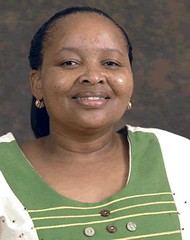
South African Minister of Land Affairs, Ms. Lulama Xingwana, who faces the monumental task of redistribution in the former apartheid state.
Originally uploaded by Pan-African News Wire File Photos.
May 3rd 2007
OUDTSHOORN
From The Economist print edition
Plenty of farms are for sale, but blacks still find it hard to buy
TWELVE years ago, Barry Levinrad, who works for the Department of Land Affairs in George, on South Africa's scenic Garden Route east of Cape Town, used to receive death threats. Today, he says, life is a lot more peaceful: very few people now disagree that land ownership needs to be reformed. At the same time, it is widely agreed that the chaotic land transfers in neighbouring Zimbabwe should be avoided. But this change in attitude has not been matched by much progress on the ground. There, frustration among poor rural people is mounting.
When the African National Congress (ANC) took power in 1994, with the black majority's overwhelming backing, whites owned about 87% of South Africa's farmland. The new government set a target for at least 30% of it to be transferred to blacks by 2014. More than a decade on, only 4% has changed hands. Now, under pressure from its core supporters, the government says it will expropriate more land and review the willing-seller-willing-buyer principle under which it has operated so far.
In January, the Pniel farm in Northern Cape province became the first to be expropriated after its owner, the Evangelical Lutheran Church, and the government failed to agree on the terms of a sale. But although the word conjures up the spectre of Zimbabwe's disastrous land grabs, expropriation in South Africa is not as harsh as it sounds. Such sales have been orderly if compulsory. In the case of Pniel farm, the church got 35.5m rand ($5m) in compensation. The government says that expropriation, a lengthy process, remains a last resort, only for when negotiations with sellers stall completely.
Why has land reform been so slow? Land restitution, or compensation for those blacks who were forced off their historic land after 1913, as in the case of Pniel, has in fact gone quite smoothly: 90% of claims have been settled, mostly in cash. But many larger, more complex rural claims are outstanding; redistribution to new owners has been much slower.
Part of the problem is red tape and incompetence. Like most arms of government, the Department of Land Affairs is short of trained officials. Tales abound of unanswered phone calls, missed appointments and lost files. The government, for its part, accuses farmers of inflating land prices and stalling on negotiations.
There is no shortage of willing sellers, though. About 5% of farmland has been up for sale every year, which in theory makes the 30% target look easily obtainable. In KwaZulu-Natal, black farmers have actually bought as much land on their own as the government has redistributed.
But there is often a mismatch between the farms for sale, usually quite large ones, and what would-be farmers can buy with the small government grants they receive. By law, to preserve efficiency, farms may not be subdivided. And though exceptions can be made, getting permission for them is cumbersome and rare.
The result is farms owned by dozens of people pooling their resources, often with dire results. The new owners may have different ideas about how to run the farm, or whether to farm at all. Many lack the experience or money to make things work: most transferred or restituted farms fail.
South Africa's white-owned farms were built up over many decades, with massive government support. But subsidies and trade barriers have vanished over the past decade, so commercial farmers have been opting out in droves, unable to make ends meet: from 60,000 in the early 1990s, there are 45,000 today. Successful farms have got larger, with machines replacing labour. Hundreds of thousands of farm workers have lost jobs.
The government seems unclear about what sort of farming it wants. New and inexperienced farmers are unlikely to survive on small plots without a lot of support. What the government provides is often too little, too late. Three years ago, Leonard Le Roux, a coloured (mixed-race) farmer and 41 others pooled their grants to buy Die Kop, a farm in the Karoo, the vast dusty grassland in the south and west of the country.
But it took two years to get money from the government to buy equipment. The farm survived mainly thanks to a neighbouring farmer, who lent implements and advice. “It's not the lack of will but rather the lack of synchronisation between state and market that fails land reform,” says Mohammad Karaan, who chairs the National Agricultural Marketing Council.
But hope persists. Land affairs officials are sounding keener on shared-equity schemes, whereby new farmers team up with experienced ones, often the previous owner. Johan Keller, for instance, has sold one of his farms near Oudtshoorn, in the Karoo, to his workers. Together they have formed a management company, of which he owns 70%. The idea is that he will gradually shift more responsibility and equity to his former workers and then withdraw, but he reckons it will take much time and effort before they can stand on their own feet.
Another group of prominent Afrikaner businessmen and academics is organising hands-on support and encouraging partnerships between new and old farmers in the Renosterrivier area, in the Free State. Large sugar mills are also supporting small black farmers, buying what they produce and helping with advice and finance.
Lulama Xingwana, the agriculture and land affairs minister, promises to shake things up still more. “If we don't get land reform right,” says her deputy, Dirk Du Toit, “we're sitting on a time bomb.”
No comments:
Post a Comment